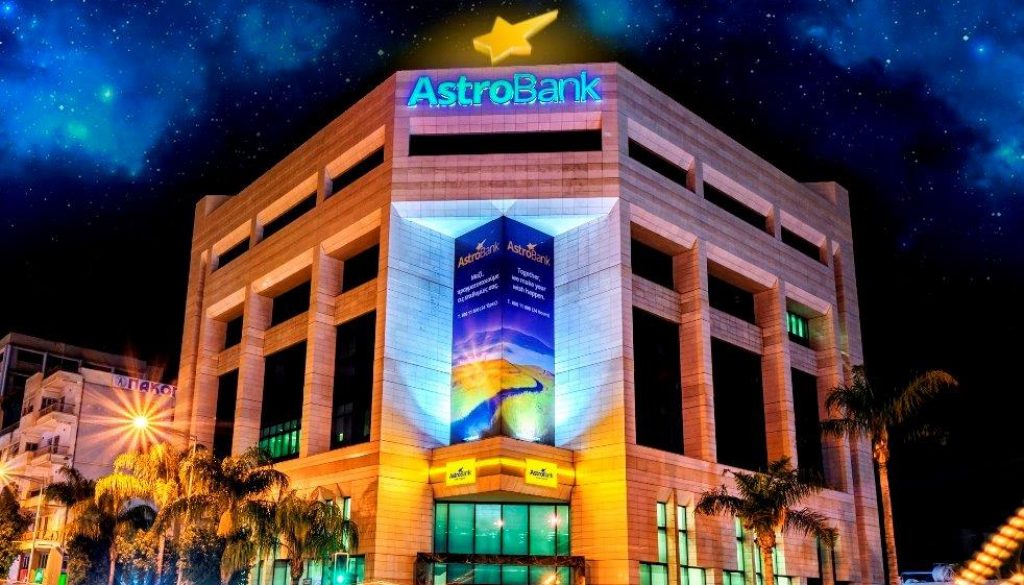INTERVIEW WITH DR. SHADI A. KARAM, CHAIRMAN OF BOARD OF DIRECTORS, ASTROBANK
- How do you evaluate the performance of AstroBank, what where the main challenges, major achievements and accordingly plans for the near future?
The past year has been a very difficult year worldwide, as economies everywhere had to grapple with an unusual, pervasive phenomenon, never experienced before in modern times. It was a surprising fact and a sobering experience to see how insufficiently prepared countries are, rich and poor, advanced and developing, in the face of a serious health threat. It shows how potentially devastating biological warfare could be and how essential it is to have a universal treaty banning all forms of research aimed at weaponizing viruses and other disease generating organisms.
As for most banking sectors around the world, we have in Cyprus felt the impact of the sudden drop in economic activity in many sectors. A dry up of tourist flows, the successive lockdowns and a slowdown in foreign investment streams, have affected the performance of the hospitality, real estate, retail, services and consequently, banking sector.
At AstroBank, we decided very early on to transform the crisis into an opportunity by streamlining our operation, cutting costs and offering a voluntary retirement scheme to those of our long-serving employees who wished to leave. Parallel to that, we intensified virtual communication with our clients in order to monitor their specific issues and to remain on their side in these troubled times. The high levels of liquidity that the Bank enjoys allowed us to finance this plan and to ride the difficulties in a relatively smooth manner.
The challenges posed by the pandemic forced us to quickly develop a new approach to work in order to protect our staff and preserve the seamless continuity of our business.
I am convinced that we are emerging from the crisis a much leaner, much stronger and much improved Bank. We are now better positioned than before the crisis to pursue our growth model based on aggressive internal growth and acquisitions. This is demonstrated by our recent acquisition of the Cyprus-based operation of one of Lebanon’s major bank.
- Covid-19 pandemic has caused an unprecedented and unexpected hit to the global and local economies. What financial and economic measures has AstroBank taken in response to the pandemic? Is it true that you have volunteered a salary cut?
I have indeed taken a voluntary 50% decrease in my financial package as an incentive to render the cost-cutting measures we were implementing, more palatable for my colleagues. The Board thanked me for this initiative and adopted it.
As for AstroBank, it was essential for us from the onset to maintain our capital base at comfortable levels, to closely manage our loan portfolio by keeping a close contact with our clients, to enhance our non-interest revenue flows and preserve the profitability of our transaction banking activity. We have successfully achieved all this and we have simultaneously implemented a general reorganization of our various business units.
- As vaccination rates are increasing and businesses returning to work, social distancing and health procedures became part of the new normal post pandemic era, and institutions are accordingly adopting measures to protect both employees and clients. What are the actions taken by AstroBank in this regard?
Throughout the past 18 months, we have operated by splitting our staff in two and sometimes even three groups. Alternating work from home and presence in the offices, while relying heavily on online meetings. We have also instituted rigorous health protocols and protective procedures involving frequent sanitization of the premises, regular PCRs, and daily cleaning methods involving scrubbing possible contamination contact points with antiseptic products, at regular intervals. We found most of these procedures to be very useful in preserving a clean environment and we have decided to maintain them. In fact, we have scrupulously followed the directions of the Ministry of Health such as social distancing and often went above and beyond by applying extra precautionary protocols for both our staff and our clients.
- Triggered by Covid-19, digital transformation has become an imperative necessity rather than just being innovative necessity. What services is AstroBank focusing on in the field IT infrastructure, information technology system and digital banking services?
AstroBank considers digitalization to be one of the most important pillars of its strategy. Soon after we acquired the Bank, we launched the mobile payment system, “sKash” and started working on improving our digital platform. This platform already offers a fully integrated web based, user-friendly environment through which one can perform all banking operations, read the recent news concerning the Bank, read about the Bank’s real estate properties offered for sale and proceed with utility payments among other things. Additionally in 2020, we launched our paperless cashier service at all our branches. All documents provided on over-the-counter transactions are signed electronically and statements are sent to the customer’s email.
Our goal over the next few months, is to be able to implement a comprehensive Artificial Intelligence based network of services, ranging from client onboarding to credit analysis, retail, compliance, and all other business avenues that could benefit from automated handling.
- How can the Cypriot banking sector and specifically AstroBank assist in reviving the local economy and attracting foreign investments?
In the post pandemic period, we will undoubtedly witness strong economic growth. Banks have to stand ready to accompany, encourage and sustain this movement especially by providing facilities to small and medium-sized enterprises. Simultaneously, we must generate innovative and creative ways to help existing customers who suffered from the crisis regain a foothold in their respective business sectors. This means adopting an intelligent, outside the box approach to handling non-performing exposures and loan restructuring initiatives.
Regarding foreign investments, Cyprus is and will remain a very attractive destination, with a lot to offer. It is a European Union member state, it is well-run, it is stable, it has a relatively efficient and predictable tax system, it has signed sixty-seven Non-Double Tax Treaties, authorities are investor-friendly, the workforce is educated, and it has some very promising prospects with probable gas discoveries in its maritime zone. To top it all, the quality of life on the island is exceptional.
AstroBank and I personally never miss an opportunity to promote Cyprus both locally and abroad.
- What initiatives has AstroBank taken in the field of Corporate Social Responsibility?
CSR is an integral part of our culture, values and strategy, but also of our daily operations. Earlier this year, we produced a large-scale Report recording our activities in this field. Our CSR contributions focus on society, education, culture and the environment. Among our numerous activities and campaigns, we have implemented a renowned, nation-wide event to increase awareness about breast cancer prevention, while we support the Junior Achievement Cyprus to promote entrepreneurship. Our efforts go far beyond what a bank our size would dedicate to CSR. AstroBank’s contribution to the society has been widely recognized, and the Bank is shortlisted amongst the top 5 companies of 2020 for the Corporate Social Responsibility award, by the well and long-established ‘In-Business Awards’ in Cyprus.
- On a personal level, and after all these success you hold under your belt, what are your expectations and plans and maybe wishes for the near and far future for Cyprus and Lebanon?
For Cyprus, the future is somewhat predictable. It will keep growing, it will continue offering attractive opportunities and it will prosper in a healthy and environmentally respectful way.
Regrettably, I see a very gloomy future for Lebanon if there is no fundamental change in leadership. There are several valid models to address the existential issues that the Lebanese people face. All have a reasonable chance of success. However, none can be applied without fundamental reforms and the present political system and those who control it are incapable of undertaking such reforms. It is those same leaders who dragged Lebanon in this abysmal disaster because of incompetence, unparalleled corruption, nepotism and cronyism. Unfortunately, there are no convincing signs that a solid opposition is likely to emerge soon in order to topple the present leadership through fair elections and pave the way for salutary change.



